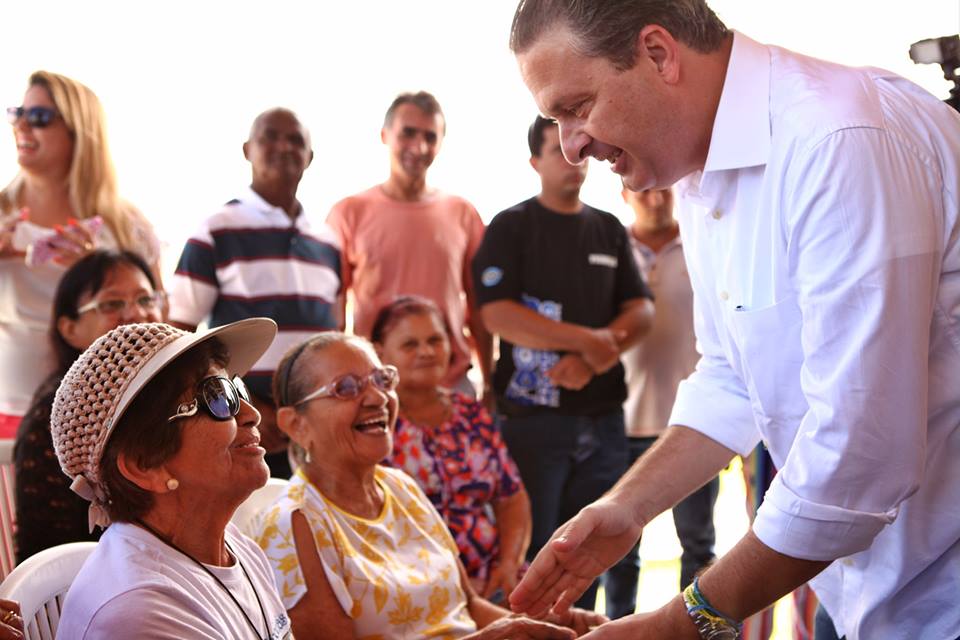Eduardo Campos, a popular former two-term governor of the northeastern Brazilian state of Pernambuco, and a former minister of science and technology nearly a decade ago under former president Luiz Inácio Lula da Silva, died at age 49 today in a tragic airplane crash while campaigning in the coastal state of São Paulo earlier today. ![]()
![]()
Campos was one of seven people on board the small plane, all of whom died when the aircraft crashed into a neighborhood in the port city of Santos, reportedly due to poor weather.
Dilma Rousseff, Brazil’s president, and Campos’s rival in the upcoming October presidential election, called for a three-day period of national mourning and suspended her own campaign activities.
Campos (pictured above) was selected as the presidential candidate of the Partido Socialista Brasileiro (PSB, Brazilian Socialist Party). Once a supporter of Lula da Silva and his successor, Rousseff, the Brazilian Socialists, under Campos’s leadership, left Rousseff’s broad government coalition last November, and the party has been gaining support in recent years.
Polls generally showed that Campos trailed Rousseff, who is seeking reelection as the candidate of a wide coalition headed by her own Partido dos Trabalhadores (PT, Workers Party), as well as the more center-right candidate, Aécio Neves, the candidate of Serra’s center-right Partido da Social Democracia Brasileira (PSDB, Brazilian Social Democracy Party). The most recent Ibope survey, dated August 3 to August 6, gave Rousseff 38%, Neves 23% and Campos 9%, though the race was expected to narrow as more Brazilians paid increasing attention to race.
Accordingly, Campos and his popular running mate, Marina Silva (who was not on the flight with Campos), were capable of building a serious campaign alternative to both Rousseff and Neves, with possible banks of support among urban progressives in cities like Rio de Janeiro and Brasília; rural voters from Campos’s Nordeste region, who have tilted tilting more to the left in recent years; and former lulista supporters disenchanted with the growing centrism of the Worker’s Party.
The PSB, and the wider coalition that had united to support Campos, has ten days to decide how to replace Campos, but Silva would almost certainly be the best to carry forward Campos’s legacy, and she’s by far the most well-known candidate who could so quickly replace Campos.
* * * * *
RELATED: Rousseff holds weak lead as reelection challenge
looms in Brazil
* * * * *
Late last year, Campos formed an alliance with former presidential candidate Marina Silva, a former environmental minister, green activist, evangelical and prominent Afro-Brazilian figure who won nearly 20% of the vote in the last presidential election in 2010.
Though Silva was running as Campos’s running mate in the current election, and she even formally joined the Brazilian Socialists to do so, many of her fans believed that Silva — and not Campos — should have led their joint ticket. Running on the strength of Campos’s legacy, her own popularity and the broad leftist platform that the PSB and its allies espouse, Silva’s candidacy could upend the race into a close three-way contest.
Campos comes from a long line of Brazilian politicians in Pernambuco, where his grandfather, Miguel Arraes, served three times as state governor, in addition to serving as mayor of Recife and as a member of the Brazilian parliament, despite a 15-year exile during Brazil’s military government of the 1960s and 1970s.
Campos knew something about being an underdog. After a long career in both Brazilian federal politics and in state politics, Campos first ran for governor of Pernambuco in 2006, starting the race, as in 2014, far behind in third place. He ultimately won election in the second-round runoff with over 60% of the vote, with Lula’s support. When he ran for reelection in 2010, he won over 80% of the vote in the first round, giving him the highest margin of support of any gubernatorial candidate in that election cycle.
Campos received strong marks for his seven-year stewardship of Pernambuco, where he stepped down as governor only in January to run for the Brazilian presidency. With the support of both the Lula and Rousseff administrations, his Pacto pela Vida (Pact for Life) generally reduced violent crime throughout the state, with homicides falling by between 30% and 40%.
Pernambuco, a narrow strip of a state in the center of the Brazilian Nordeste region, is home to around 8.9 million people, making it the seventh-most populous state in Brazil, and its capital, Recife, is one of Brazil’s largest cities. Lula da Silva himself is a Pernambuco native of the inland town of Caetés.
Like other parts of Brazil, continuous Portuguese rule between the 16th and 19th centuries was interrupted by Dutch occupation in the middle of the 17th century. Once the center of Brazil’s 19th century aristocratic, slave plantation economy, the Brazilian northeast faded in economic viability with the rise of the coastal economies in Rio de Janeiro and São Paulo. Despite that, the state grew at a higher rate than average national growth during Campos’s gubernatorial administration.

2 thoughts on “Eduardo Campos, Brazilian presidential candidate, dies in plane crash”